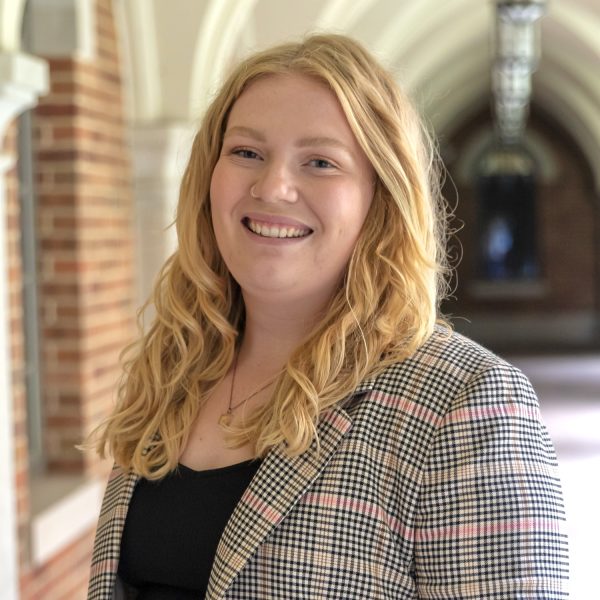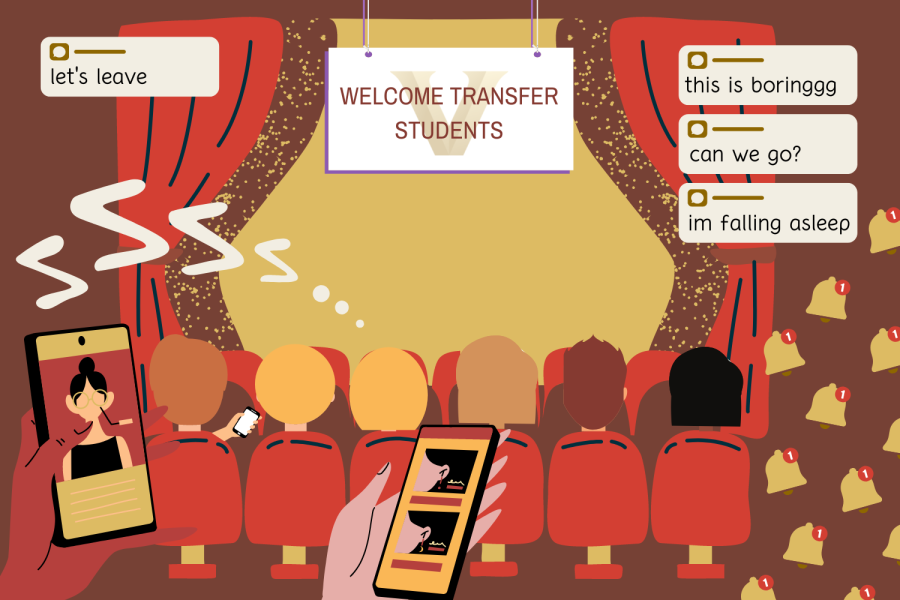Since Transfer Student Appreciation Week ended in late October, I’ve been reminiscing about my time at Vanderbilt and how my path to transfer here has unfolded since moving here in the fall of 2023. Genuinely, my experience at this university could not have turned out better. I’ve met countless friends, explored all Nashville has to offer and had incredible learning experiences from top-notch faculty. However, these experiences were set back in the first week by a mind-numbingly dull transfer orientation, filled with repetitive information sessions and awkward encounters with my transfer class.
The start of the orientation experience was marked by overbearing smiles from transfer student leaders and members of staff advertising Vanderbilt like it was the Disneyland of the South. Upon checking in, I received a printed schedule packet filled with mandatory training sessions and social events, leaving little room for breaks and time to meet people outside of the groups we were assigned to. As the week went on, I found that many of these events were extremely redundant. The information demonstrated was already highlighted on the transfer page of the Vanderbilt website or in the modules we had to complete online before arriving. Each day, I found myself bored, stuck with transfer students with which I had little in common and eager to fast forward through the week so I could start to live the life I wanted.
Though I met some friendly faces I still greet when passing in front of Rand, the mandatory social events meant to bond our transfer class led to only a few of the friendships I’ve maintained throughout my years on campus. Though food trucks and trivia nights sound like fun events in theory, Vanderbilt staff leered over us as we tried to find someone with shared interests, acting like parental figures instead of event planners. Even though I had completed two years of college at another university where I already gained independence, I felt as if I was at a summer camp under the watchful eye of camp counselors.
Overall, I felt uncomfortable opening myself up to other students while under the constant surveillance of staff. Though our orientation was technically separated from the first-year class, each step of my transfer orientation journey felt surveilled, juvenile and overall very similar to my first-year orientation at the University of Georgia. The conversations with my transfer group members were limited to orientation activities rather than creating deep bonds, limiting the connection that could develop.
After thinking about what Vanderbilt could change to improve the efficiency of transfer orientation, I decided to connect with transfer students from Vanderbilt and other universities to get first-hand perspectives on their orientation experiences.
Vanderbilt transfer student and alumna Becca Hall (B.S. ‘23) noted that she “honestly can’t remember” much about her transfer orientation experience, despite her attending in-person sessions daily. Though there were multiple sessions per day, she recalls that “mandatory events could be dodged with essentially no consequences,” something I also witnessed in my orientation experience. Ultimately, she notes that her transfer experience was overall positive, allowing her to make new friends, but she notes that some of the helpful optional programming like a class schedule walk-through was “drowned out in all the mandatory programming.”
When taking a further look at some of the mandatory programming Hall mentions, I found that the events in question can be broken down into three categories: navigating campus resources, general transfer class bonding and conversations with smaller transfer groups with an orientation leader. Though I experienced a sense of redundancy and awkwardness in all three categories of these events during my orientation, I found the most frustration in sessions navigating campus resources in terms of content and the lack of acknowledgment of my previous university experience.
Only a small portion of the campus resource sessions in my orientation focused on learning about academic offices like the College of Arts and Sciences or meeting with Immersion Vanderbilt advisors to discuss the nature of the graduation requirement. However, many of the mandatory events in the campus resource category surround conversational topics required by many universities around the country, such as alcohol, sexual assault awareness and prevention or academic integrity. While these topics are essential to understand and absorb before stepping foot on any college campus, I believe these sessions could have been sent in an email, mailed brochure or an online module format. From my experience, my first-year orientation at my previous institution covered these topics extensively, something many of my transfer peers claimed to go through as well.
As someone who has already lived a full two years of college at a previous university, it feels redundant and degrading to sit alongside the first-year class in these sessions, wiping away any of the previous university experiences that I have already lived. Similar to Hall, I recall seeing members of my transfer class, also feeling frustrated by having to relive these courses, slip out the back mid-session to use their time in a way they felt was more important — like exploring Nashville.
Tyler Newton, a senior at the University of Texas at Austin, gave me a new perspective by sharing the positive aspects of his transfer orientation. He mentioned that his online orientation focused on registering for classes, meeting with his academic advisor and learning about campus organizations with which he could get involved. Students had the opportunity to join pods, a group of five to six students, to meet students within their specific undergraduate major — though it was not required. However, by participating in the pod system, the school guaranteed that those students would earn a spot in a class within their major, something that students at a large university like UT Austin often struggle with due to small class sizes. Though the orientation had the downside of being online due to COVID-19, Newton claimed that “the ability to walk through your schedule and what your major requires was really nice.”
Something I find unique about UT Austin’s transfer orientation experience is that it provides information about the university while rewarding students who choose to actively participate in the program. Though Vanderbilt requires all transfer students to participate, there are rarely incentives for transfers to attend these events other than the fact that they’re required, leaving students unenthusiastic about participating.
Generally, this lack of enthusiasm closed transfer students off emotionally during social events and informational sessions. Since most in the transfer class did not want to attend these sessions, conversations about the hardships of transfer life or unique perspectives gleaned from our previous universities never presented themselves, and I found myself further unable to get to know people within my transfer orientation group. My orientation experience had me asking myself what Vanderbilt could be hiding in terms of existing student gripes or campus concerns rather than making me feel genuinely comfortable in my transition to life on campus.
Based on what I’ve learned about the transfer experience at Vanderbilt and other schools, I think that Vanderbilt’s residential college office needs to take another look at how they shape the transfer orientation experience. Instead of mandatory ice-breakers that make us feel like we just left home for the first time, we should be discussing what experiences we had at our old schools, how they shaped us and how we can take those learning opportunities with us going forward. By creating genuine bonds about the hardships of moving to a new school, transfer classes will be stronger, feeling more secure in ourselves when we break into campus life with the rest of the student body.
So, what can we do to improve the transfer experience?
Feeling over-satisfied with information and underwhelmed with social connections I made during my transfer orientation, I feel there are a few methods that could help make transitioning to Vanderbilt smoother, quicker and a more satisfying, in-depth experience.
Acknowledge our previous experiences
As transfer students, our one similarity is that we came from other universities and colleges of all shapes and sizes. Our individual experiences are unique, but we all made the decision to leave and, more importantly, come to Vanderbilt. We have an array of backgrounds, thoughts and college experiences, some of which can make the university better if discussed and heard. Even after orientation, including transfer students in highly selective clubs and on-campus opportunities can spark more well-rounded representation. By allowing us to feel comfortable speaking about life before Vandy, we can channel our positive feelings about our old schools into action unseen by those who didn’t go somewhere else beforehand.
Show us the reality of life on campus right when we arrive
Instead of making Vanderbilt seem shiny and new, we must know what we’re getting into right when we get here. Many transfer students have had some form of a negative experience at their old college, or, at the very least, something that they would like to change in their educational experience. What we don’t want is the photoshopped version of our new school — we want to be reassured that, despite already having a college experience, our new one will be genuine.
Bring in students to orientation who have attended Vanderbilt since their first year
While it’s comforting to know that our Transfer Student Leaders all had similar experiences of going through orientation and finding their place at Vanderbilt, it creates a skewed reality upon arrival that transfers tend to stick together. By including older students who came to Vanderbilt at the start of their college career, we can better understand some of the lingo and life on Commons while getting to know students who can better help us integrate beyond the transfer bubble.
At its core, I believe that transfer orientation shouldn’t be designed to show us the shiny side of Vanderbilt or give us the information we’ve already lived with for years. Sacrificing authenticity and connections for swag bags made me feel exactly how I do when I’m attending my nearest Disney park: overstimulated and questioning the magic. Though food trucks and free merchandise are nice perks, they can’t beat the feeling of making genuine connections. Therefore, Vanderbilt should trade the glitz and glamor for something that will last a lifetime: the feeling that we are finally home.








IT Telkom • Nov 29, 2024 at 7:44 pm CST
How can including older students who came to Vanderbilt at the start of their college career help transfer students integrate better beyond the transfer bubble?